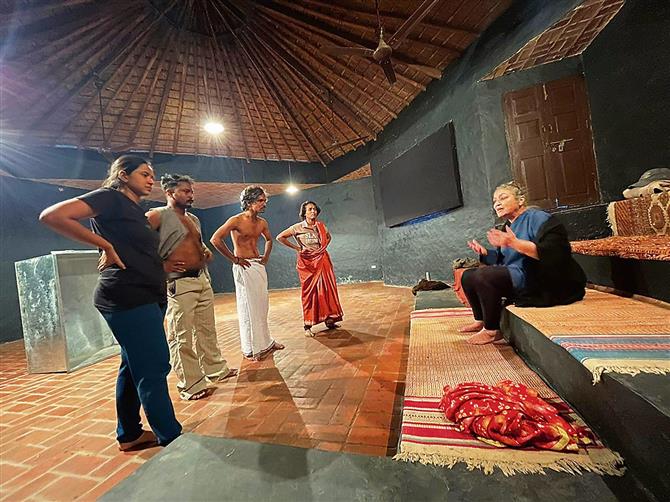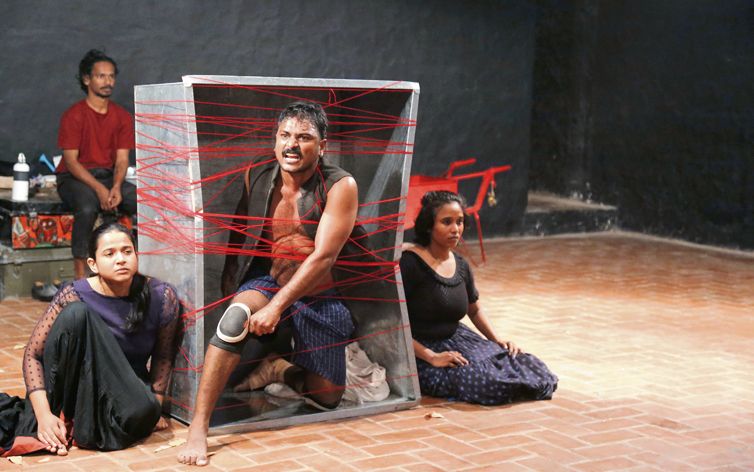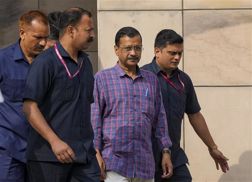
Visiting students rehearse with Neelam Mansingh in Chandigarh.
Neelam Mansingh Chowdhry
LET us imagine an invisible line drawn across the length of a rehearsal space. Two groups, unknown to each other, tentatively walk towards each other. Watchful, unsure and hesitant. A verbal language that is unfamiliar to both needs to be negotiated, as well as different ways of performance making. Malayalam, a language unknown to the two Punjabi directors — Vansh Bhardwaj and myself — might have got us entangled, I thought, in a ‘lost in translation’ moment. Was it going to be an unsolvable dilemma? An unusual challenge? An unsurmountable impediment? Perhaps all three or none of the above. After all, theatre is not only about words. Its visual imagery, sounds and image-making are also essential ingredients for directing a play.

It’s not that this kind of experiments have not happened before. Many foreign directors have worked in India without knowing the regional language. I recall a project I did in Japan with actors from Southeast Asia, a production in which a range of languages — from Chinese to Malay, Thai to Punjabi, Japanese to Khmer, English to Sinhala — with varied cadence, sound patterns and intonations creating an orchestration of sounds, segued seamlessly. No jostling for space... smooth, lilting, without becoming cacophonous. Barriers of language were traversed due to interpreters. In Chandigarh, we did not have that advantage.
Four young actors with a stage manager arrived in Chandigarh from the School of Drama and Fine Arts, University of Calicut, speaking, as they said charmingly, ‘little-little English and little-little Hindi’.
In this improvised space of multilinguistic sounds, we started work on Saadat Hasan Manto, a great raconteur of the 20th century. His stories, free of religious biases and national zeal, dealt with the complexities of loss, grief, poverty and gender politics in an ethos both powerful and timeless.
Manto’s stories are not polite. He constantly challenged the hypocrisies and deceptions of the society. His stories forced his readers to ask complex questions about gender, disparity and misogyny.
My conundrum was how to begin, how to proceed, and who were our allies — questions that needed to be investigated and dissected as part of the process. We had no definitive script to begin with, just a few stories ostensibly disconnected thematically.
‘Tamasha’, ‘Ten Rupees’, ‘Smell’, ‘Dog of Tetwal’, ‘Rats of Shahdol’ and ‘The Hundred Watt Bulb’ — fragmented, fractured and unrelated — were selected by the actors after much deliberation. To work on a production without a cohesive conceptual framework is always fraught with uncertainty. But within that uncertainty, possibilities can also exist, or can collapse, a risk I was willing to take. The notion of probability with its addendum of exploration was hard to resist.
For me, the process of rehearsing has always been more meaningful than the final product. In this unstructured way of working, everything is fluid and there is an absence of closure. The actors become active participants and collaborators in evolving the final shape of the production.
Improvisation has always been the backbone and starting point of my work process. A new language emerged through this process, ‘the performative language’ of images, body, objects and gestures. One of the actors said, “It was a challenge breaking out of our comfort zone and giving precedence to the performative language over the verbal.”
Manto frames his stories against the backdrop of Partition. As I was born post-Partition, my parents’ stories about Rawalpindi and Lahore became my narratives. For the actors from Kerala, Partition was an emotionally distant historical event.
Violence, memory, eroticism and resistance become the running leitmotif of the narratives, but within that, glimmers of affirmation, hope and compassion were in evidence. The capacity of human beings to rebuild their world over and over again, despite destruction and loss, indicates the resilience and desire to ‘live’ that exist within all of us. These are the lives of the forgotten people, those who exist in the margins and fringes of society.
I saw this play as episodic, a story emerging from another, without any obvious connection. Sometimes we fragmented a plot and sometimes we dovetailed two narratives. I also recognised that in a dramatic performance, language is an important aspect, but is not the only author of a performance; objects, gestures, body, all play an equally decisive role in creating the mise en scène.
But what we shared during rehearsals was precious to all of us. We connected with the practice of creation; as a result, it existed in a liminal space between the lived experience and the written word, between formality and history, improvisation and the future.
Translation is not taking one text, referring to a dictionary and changing it to another text. Translation is also an active practice, an alchemy of becoming. Texts travel, theatres travel, bodies travel.
Playwright Antonin Artaud said, “The theatre, which is in no thing, but makes use of everything — gestures, sounds, words, screams, light, darkness — rediscovers itself at precisely the point where the mind requires a language to express its manifestations. To break through language in order to touch life is to create or recreate the theatre.”
Physical borders are complicated but nothing compared to the emotional and ethical borders that we impose on ourselves. Through his writings, Manto has managed to cross borders. Lines drawn randomly by barbed wire are not evident in his writings; rather they are mocked, reverentially and with sadness, at the absurdity of artificial demarcations. This is perhaps why he is claimed by both India and Pakistan.
In the context of what’s happening in the world — wars and conflicts, hatred and prejudices — it becomes imperative to tell stories and that people listen to each other’s stories. His work acts like a catalyst to transform geographies and language and even defy time. Manto shares with us the stories of mankind and hopefully makes us more ‘human’.
Join Whatsapp Channel of The Tribune for latest updates.


























